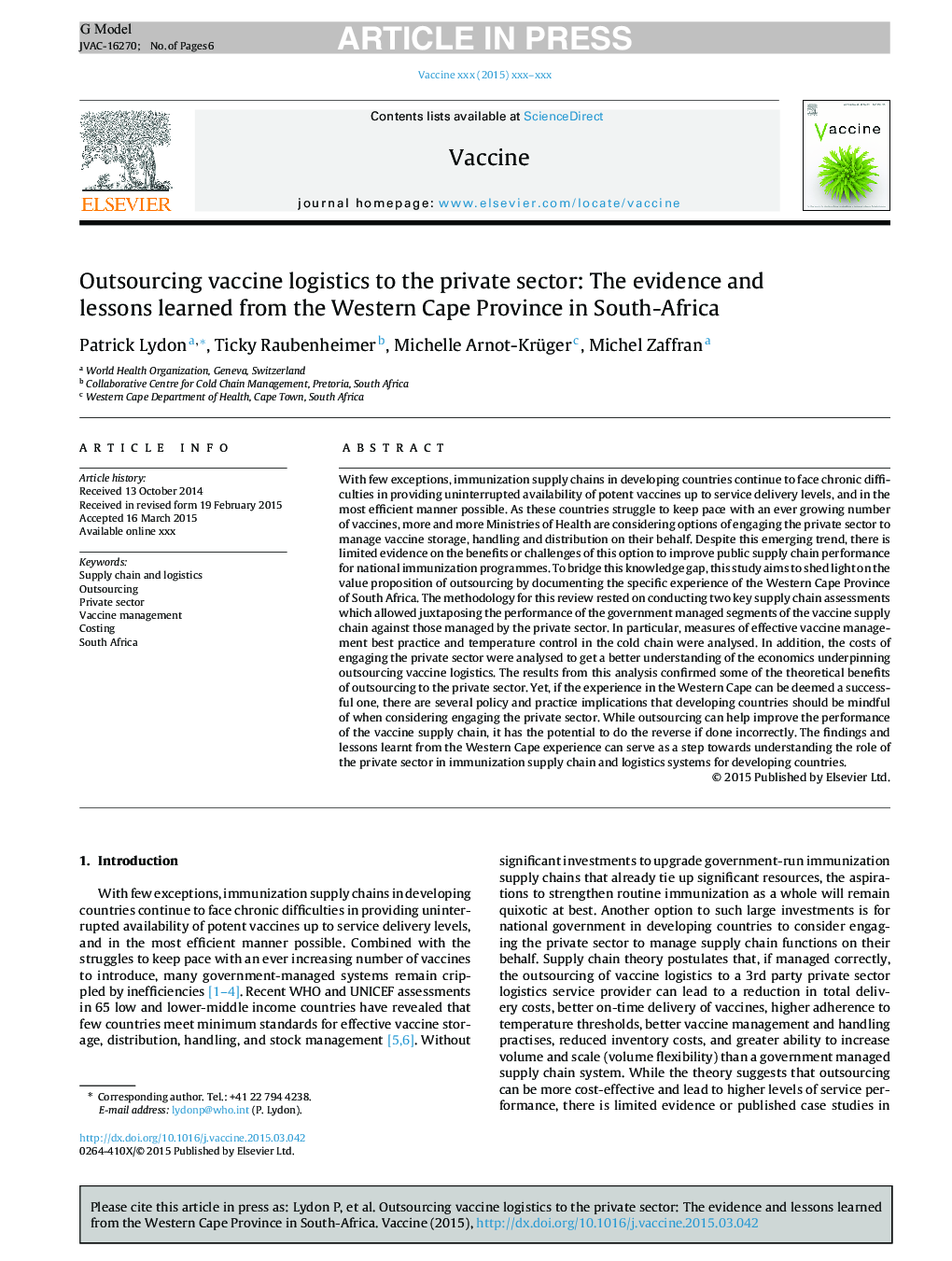| کد مقاله | کد نشریه | سال انتشار | مقاله انگلیسی | نسخه تمام متن |
|---|---|---|---|---|
| 10964831 | 1102727 | 2015 | 6 صفحه PDF | دانلود رایگان |
عنوان انگلیسی مقاله ISI
Outsourcing vaccine logistics to the private sector: The evidence and lessons learned from the Western Cape Province in South-Africa
ترجمه فارسی عنوان
برون سپاری تدارکات واکسن به بخش خصوصی: شواهد و درسهایی که از استان غربی در آفریقای جنوبی گرفته شده است
دانلود مقاله + سفارش ترجمه
دانلود مقاله ISI انگلیسی
رایگان برای ایرانیان
کلمات کلیدی
زنجیره تامین و تدارکات، برون سپاری، بخش خصوصی، مدیریت واکسن، هزینه کردن آفریقای جنوبی،
ترجمه چکیده
با چند استثنا، زنجیره تامین ایمن سازی در کشورهای در حال توسعه همچنان در مواجهه با مشکلات ناشی از دسترسی بی وقفه واکسن های قوی به خدمات تحویل و در موثر ترین راه ممکن ممکن است. از آنجایی که این کشورها تلاش می کنند تا با تعداد بیشتری از واکسن ها رو به رو شوند، وزارتخانه های بهداشت و درمان بیشتر در حال بررسی گزینه هایی برای دخالت بخش خصوصی برای مدیریت ذخیره سازی، توزیع و توزیع واکسن از طرف آنها هستند. علی رغم این روند در حال ظهور، شواهد محدودی در مورد مزایا و یا چالش های این گزینه برای بهبود عملکرد عمومی زنجیره تامین برای برنامه های ایمن سازی ملی وجود دارد. برای برطرف کردن این شکاف دانش، این مطالعه با هدف مستند سازی تجربه خاص استان غربی غربی آفریقای جنوبی، بر گزاره ارزش برون سپاری تأکید می کند. روش برای این بررسی بر روی انجام دو ارزیابی کلیدی تدارکاتی بود که اجازه می داد تا عملکرد بخش های مدیریت شده زنجیره تامین واکسن را در مقایسه با آنهایی که توسط بخش خصوصی اداره می شد، کنار بگذارند. به طور خاص، اقدامات مدیریت بهتر واکسن مدیریت و کنترل دما در زنجیره سرد مورد تجزیه و تحلیل قرار گرفت. علاوه بر این، هزینه های مربوط به درگیر شدن در بخش خصوصی، مورد تجزیه و تحلیل قرار گرفت تا یک درک بهتر از اقتصاد پایه گذاری لجستیک واکسن برون سپاری شود. نتایج حاصل از این تجزیه و تحلیل برخی از مزایای نظری برون سپاری را به بخش خصوصی تأیید می کند. با این حال، اگر تجربه در کیپ غربی می تواند یک موفقیت آمیز باشد، پیامدهای متعددی از سیاست و عمل وجود دارد که کشورهای در حال توسعه باید در هنگام مشارکت در بخش خصوصی مراقب باشند. در حالی که برون سپاری می تواند به بهبود عملکرد زنجیره تامین واکسن کمک کند، اگر نادرست انجام شود، ممکن است معکوس شود. یافته ها و درس های آموخته شده از تجربه کیپ غربی می تواند به عنوان یک گام در جهت درک نقش بخش خصوصی در سیستم زنجیره تأمین ایمن سازی و سیستم های تدارکات در کشورهای در حال توسعه کمک کند.
موضوعات مرتبط
علوم زیستی و بیوفناوری
ایمنی شناسی و میکروب شناسی
ایمونولوژی
چکیده انگلیسی
With few exceptions, immunization supply chains in developing countries continue to face chronic difficulties in providing uninterrupted availability of potent vaccines up to service delivery levels, and in the most efficient manner possible. As these countries struggle to keep pace with an ever growing number of vaccines, more and more Ministries of Health are considering options of engaging the private sector to manage vaccine storage, handling and distribution on their behalf. Despite this emerging trend, there is limited evidence on the benefits or challenges of this option to improve public supply chain performance for national immunization programmes. To bridge this knowledge gap, this study aims to shed light on the value proposition of outsourcing by documenting the specific experience of the Western Cape Province of South Africa. The methodology for this review rested on conducting two key supply chain assessments which allowed juxtaposing the performance of the government managed segments of the vaccine supply chain against those managed by the private sector. In particular, measures of effective vaccine management best practice and temperature control in the cold chain were analysed. In addition, the costs of engaging the private sector were analysed to get a better understanding of the economics underpinning outsourcing vaccine logistics. The results from this analysis confirmed some of the theoretical benefits of outsourcing to the private sector. Yet, if the experience in the Western Cape can be deemed a successful one, there are several policy and practice implications that developing countries should be mindful of when considering engaging the private sector. While outsourcing can help improve the performance of the vaccine supply chain, it has the potential to do the reverse if done incorrectly. The findings and lessons learnt from the Western Cape experience can serve as a step towards understanding the role of the private sector in immunization supply chain and logistics systems for developing countries.
ناشر
Database: Elsevier - ScienceDirect (ساینس دایرکت)
Journal: Vaccine - Volume 33, Issue 29, 26 June 2015, Pages 3429-3434
Journal: Vaccine - Volume 33, Issue 29, 26 June 2015, Pages 3429-3434
نویسندگان
Patrick Lydon, Ticky Raubenheimer, Michelle Arnot-Krüger, Michel Zaffran,
